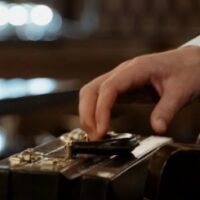To start at the beginning of the story go here.
When none of Sartre’s man opened fire, Atwell and Lanzo followed. In that afternoon silence, I thought I could hear something like the rotating drum of a cement mixer.
One of Sartre’s men, professional enough not to gesture with his weapon, stepped forward and pointed past the carpark. A dirt path disappeared behind it, headed uphill from the house. I nodded and moved that way, feeling Atwell and Lanzo behind me.
The latest rain couldn’t have been far behind as the path was still a bit muddy, something I trudged through without concern as it was high time to shine my shoes anyway. Lanzo stumbled through it like a shell-shocked refugee while Atwell fell behind, trying to pick and choose his path from one dry spot to the next. As we headed up the slope, the rhythmic percussion sound grew louder.
Not far from the carpark was the grassy peak of the hill the house was built on. Three other rooks stood around watching Sartre walk a worn path that led to the top, their eyes shaded with admiration. The Night Governor, on the other hand, paid no attention to anything but what he was doing. He was stripped to the waist, thick muscles straining as he pushed a boulder up the hill.
His grunting travelled down the short slope followed by the sound of the rock rolling down after he released it, producing the cadenced noise we’d heard. From the top of the hill, Sartre let out a barking laugh and raised his hands into the air like he was Rocky Balboa. I suspected he did this every time he got to the top. I guess it kept him in shape.
Sweat drenching his fireplug frame, he trudged down, taking a towel from one of his men at the bottom. Wiping sweat off himself, he closed the distance till recognized us.
As we came into focus for him, Sartre smiled his yellow smoker’s smile. Until he noticed Atwell. At that, Sartre’s demeanor became electrified with hostility, the transformation occurring so quickly I thought I’d have to get between them. Fortunately, Sartre only stood his ground and gestured at Atwell with such force I thought he was going to fling his towel at him. “What is this lavette doing here?”
To keep the peace, and Atwell alive, I said, “He saved our bacon.”
Sartre squeezed an eye shut and inspected me with the other, looking every inch like the old woman in the villa. He swabbed off his face, wiping sweat and credulity away. “What is this nonsense?”
I gestured from Atwell to Sartre, notifying him it was his turn to speak. Atwell paused long enough I worried he had forgotten our agreed upon lie, thankfully disproved when he said, “Someone knew about the service station. What you had stored there.” Under Sartre’s narrowing gaze Atwell continued, “They informed the police. The Flic were going to raid it and I only found out minutes before. I didn’t have time to find you so I had the place torched. I figured that was better than the evidence getting into official hands.”
The rigid silence that followed was only punctuated by the local insect chorus. They barely had time to get through one refrain, though, before Sartre laughed, loud enough that I could feel its forced nature. He reached out to put his arm around Atwell’s neck. Smiling with a mouth like a dirty razor blade, Sartre said, “This is true?”
Atwell, squirming against the sweaty embrace, said something in the affirmative. Still firmly holding him in the grapple hug, Sarte side glanced at me. I nodded. “It’s true.”
Sartre laughed again, this time with more honesty, not letting go but jangling Atwell. “Then I owe you! Why did you not tell me this?”
Sartre released him to grab a jug of water from one of his men. Holding it by the neck and bottom, he gestured at Atwell with it saying, “I know why. You have been following me.” He drank.
To my surprise, Atwell shrugged. “Yeah.”
Sartre slowly lowered the jug, eyes blazing at Atwell. “You think I would allow this?”
Appearing secure in the armor of being a representative of the United States Atwell stood firm. “Sartre, we have an understanding. But you don’t trust me and I don’t trust you. If I hadn’t been keeping tabs on things, then I wouldn’t have known about the station and you’d be talking to the cops.” He shrugged again. “If it makes you feel better, I watch everyone. I watch this town. It’s what I do.” All in all, it was a very impressive lie.
In a continued resemblance to the old woman down below, Sartre eyed Atwell. “Then perhaps you can tell me who informed – how did the police know about the station?”
With almost no hesitation, Atwell answered, “That’s what we’re here to talk to you about.” I had to hand it to the little rat, that was the best play there was to go with.
Atwell handed the conversation back to me with a nod, switching the focus of the Night Governor’s gaze. Moving that along, I tilted my head to Lanzo, “Have you met Moreau’s nephew?”
Having paid no attention to the Corsican until that moment, Sartre eyed him. There was a slow recognition that translated into a widening of his eyes and a lop-sided grin. “Lanzo?”
Lanzo had used the intervening time to recover himself, but even so it was clear he was having a very bad day. Fatigue and tears had ruddied his face. Whether it was because or despite this vulnerability, Sartre moved to embrace him.
Lanzo stopped him, holding up a hand when the older man got close. “My uncle is dead.”
To read the next chapter, go here.
To read the previous chapter, go here.
To read the author’s published work, go here.
Related Posts
Sundew Homes Next Post:
Never Again























